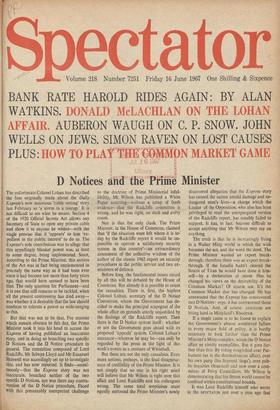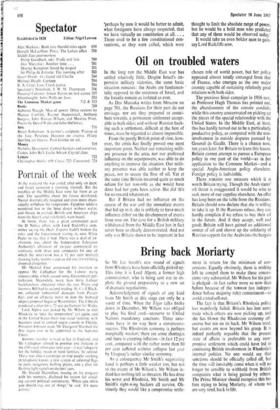D Notices and the Prime Minister
The unfortunate Colonel Lohan has described the fuss originally made about the Daily Express's now notorious 'cable vetting' story last February as 'a storm in a teacup.' It is not difficult to see what he meant. Section 4 of the 1920 Official Secrets Act allows any Secretary of State to open any private cable and show it to anyone he wishes—with the single proviso that it 'appears' to him 'ex- pedient in the public interest' to do so. The Express's sole contribution was to allege that this appallingly blanket power was, at least to some degree, being implemented. Since, according to the Prime Minister, this section of the Act was in fact being implemented in precisely the same way as it had been ever since it had become law more than forty years ago, that would have seemed to have been that. The only question for Parliament—and it is one that still remains to be tackled, when all the present controversy has died away— was whether it is desirable that the law should continue to tolerate a power as wide-ranging as this.
But that was not to be that. For reasons which remain obscure to this day, the Prime Minister took it into his head to accuse the Express of having published an inaccurate story, and in doing so breaching two specific D Notices and the D Notice procedure in general. The committee composed of Lord Radcliffe. Mr Selwyn Lloyd and Mr Emanuel Shinwell was accordingly set up to investigate this, and has now reported. It finds—unani- mously—that the Express story was not inaccurate, breached neither of the two Specific D Notices, nor was there any contra- vention of the D Notice procedure, Faced With this presumably unexpected challenge to the doctrine of Prime Ministerial infal- libility, Mr Wilson has published a White Paper asserting--without a scrap of fresh evidence—that the Radcliffe committee is wrong, and he was right, on each and every count.
Nor is this the only clash. The Prime Minister, in the House of Commons, claimed that 'if the situation were left where it is to- day by the Radcliffe report it would be im- possible to operate a satisfactory security system in this country'—an extraordinary assessment of the collective wisdom of the author of the classic 1962 report on security procedures in the public service and two ex- ministers of defence.
Before long, the fundamental issues raised by all this will be debated by the House of Commons. But already it is possible to count the casualties. There is, first, the hapless Colonel Lohan, secretary of the D Notice Committee, whom the Government has de- cided to make the principal scapegoat of the whole affair on grounds utterly unjustified by the findings of the Radcliffe report. Then there is the D Notice system itself : whether or not the Government goes ahead with its proposed 'appeals' system, Colonel Lohan's successor—whoever he may be—can only be regarded by the press in the light of this week's events as a creature of Whitehall.
But these are not the only casualties. Even more serious, perhaps, is the final disappear- ance of credibility of the Prime Minister. It is not simply that no one in his right mind will believe that Mr Wilson is right over this affair and Lord Radcliffe and his colleagues wrong. The same total scepticism must equally surround the Prime Minister's newly discovered allegation that the E.v press story has caused the nation untold damage and en- dangered men's lives—a charge which the Leader of the Opposition, who also has been privileged to read the unexpurgated version of the Radcliffe report, has notably failed to support. it has, in fact, become difficult to accept anything that Mr Wilson may say on anything.
The truth is that he is increasingly living in a Walter Mitty world in which the wish becomes the act, and the word the deed. The Prime Minister wanted an export break- through, therefore there was an export break- through. If the Israelis hadn't cleared the Straits of Tiran he would have done it him- self—by a declaration of intent. Has he changed his views on the desirability of the Common Market? Of course Hot. It's the Common Market that has changed. He has announced that the Express has contravened two D-Notices: ergo, it has contravened those D Notices. And, of course. sanctions are biting hard in Mittyland's Rhodesia. 'perhaps by now it would be better to admit, what foreigners have always suspected, that we have virtually no constitution at all. . There used to be a few constitutional con- ventions, as they were called, which were thought to limit the absolute range of power, but he would be a bold man who predicted that any of them would be observed today.' It would take an even bolder man to gain- say Lord Radcliffe now.



































